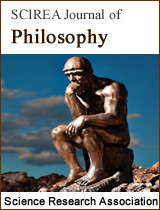SCIREA Journal of Philosophy is an
international, scientific peer-reviewed open access journal
published online by SCIREA.
Open Access
free for readers, with article processing charges (APC)paid by authors or their
institutions.
High visibility: Indexed in the Google Scholar
and other databases.
Rapid publication:
manuscripts are peer-reviewed and a first decision provided to
authors approximately 20 days after submission; acceptance to
publication is undertaken in 5 days.
Recognition of reviewers:
reviewers who provide timely, thorough peer-review reports receive
vouchers entitling them to a discount on the APC of their next
publication in any SCIREA journal, in appreciation of the work
done.
Volume 5, Issue 1, February 2025
Open Access
Mirela Kyuchukova, Veska Gyuviiska
Abstract: This article seeks to address the question: What does it mean to be an unsuccessful student in school? By examining the link between diversity and failure, we explore various concepts related to the role of learning motivation. Special attention is given to the Methodology of Power Intelligence developed by the Bulgarian in
Open Access
Haowei Shi
Abstract: This paper firstly formalizes the classical modal syllogism ⼞AEE-4, and then proves its validity, and finally derives the other 21 valid classical modal syllogisms from the validity of the syllogism ⼞AEE-4. These knowledge deduction processes not only illustrate the deductibility of ⼞AEE-4, but also demonstrate the material
Open Access
Igor Janev
Abstract: In my examinations I have discovered a new fundamentally relevant Dialectical principle omitted in Marxistic or Hegelian dialectical philosophy. That principle is related to acceleration of processes, rather than the simple static velocity based principle(s) of movement. As a consequences of that new approach we have pro
Volume 4, Issue 3, June 2024
Open Access
Igor Janev
Abstract: In the study of the general methodology of science and philosophy, we have discovered a common fundamental problem of the “paradox of the basic element” that creates inconsistencies in social and natural theory and general ontology and epistemology. Our study of the state interactions as a major international actor leads us
Open Access
Zhaolong Yuan, Cheng Zhang
Abstract: This paper first formalizes categorical propositions in syllogisms, then proves the validity of the generalized syllogism MAI-4, and then deduces other 15 valid generalized syllogisms from the syllogism MAI-4. In other words, there are reducible relationships between/among the 16 syllogisms. This study highlights the dialec
Volume 4, Issue 2, April 2024
Open Access
Qing Cao, Hui Li
Abstract: This paper firstly proves that the syllogism EMO-4 is valid, and secondly indicates the validity of the other 14 syllogisms can be deduced from that of EMO-4 with the help of generalized quantifier theory, set theory, and first-order logic. And more valid generalized syllogisms can be deduced when one continues to infer. It
Open Access
Jingyi Zhang, Yijiang Hao
Abstract: This paper formalizes Aristotelian modal syllogism within the framework of knowledge mining and subsequently proves the validity of the Aristotelian modal syllogism ▢EAO-3 through the application of modal logic and generalized quantifier theory. Moreover, by means of the integration of specific rules and facts derived from
Volume 4, Issue 1, February 2024
Open Access
Qing Cao, Long Wei
Abstract: This paper firstly presents knowledge representations of Aristotelian modal syllogisms based on the structure of modal categorical propositions; Then, the validity of syllogism ⼞AA◇A-1 was proved by using the truth value definitions of these propositions. And then this syllogism was used for knowledge reasoning with the hel
Open Access
Siyi Yu, Xiaojun Zhang
Abstract: Due to the large number of generalized quantifiers in the English language, this paper only studies the fragment of generalized modal syllogistic that contains the quantifiers in Square{all} and Square{most}. On the basis of generalized quantifier theory, possible-world semantics, and set theory, this paper shows that there
Open Access
Feifei Yang, Xiaojun Zhang
Abstract: This paper firstly provides knowledge representations of Aristotelian modal syllogisms from the perspective of mathematical structuralism, and proves the validity of Aristotelian modal syllogism E⼞I◇O-4, and then by making full use of relevant definitions, facts, and some inference rules, formally derive other 30 valid moda
Volume 2, Issue 1, February 2022
Open Access
Givi Givishvili
Abstract: Three space experiments carried out in 2004-2018 placed all points on "i" in the discussion about the nature of space-time, which began with the apories of Zeno of Eleia. Experiments have proved that space-time does not exist physically. They are what Democritus called "nothing," unlike "what," which is associated with ever
Open Access
Givishvili G.
Abstract: Empirical data in situ of recent years indicate that spacetime does not exist physically: they are not material - they do not have any of the characteristics inherent in material objects. At the same time, space-time is the most fundamental and universal mediator between all, without exception, material objects of Nature. I
Open Access
Jon K. Amundson
Abstract: Though grief and loss have been normalized in mental health discourse, a particular class ofbereavement remains as diagnosis- Persistent Complex Bereavement Disorder. Discussion of thismore complex and enduring condition is undertaken in what follows. The dynamics of grief andloss are discussed through this diagnostic categ

